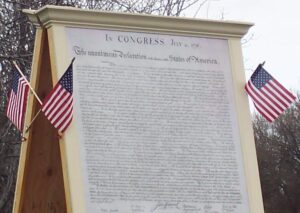See Part 1 which discusses the Internet’s affect on forgiveness. If you can’t empathize, you can’t accept an apology as genuine and thus never forgive.
Here is an example of someone who probably doesn’t know how to accept an apology or assumes it is not genuine. Unless the Trumpite who plowed Virginia’s driveway decides to turn away from Trump and become the all glorious Democrat they should be, I doubt the author of this piece will ever live in harmony with her neighbor.
Oh, heck no. The Trumpites next door to our pandemic getaway, who seem as devoted to the ex-president as you can get without being Q fans, just plowed our driveway without being asked and did a great job.
How am I going to resist demands for unity in the face of this act of aggressive niceness?
Of course, on some level, I realize I owe them thanks — and, man, it really looks like the guy back-dragged the driveway like a pro — but how much thanks?
These neighbors are staunch partisans of blue lives, and there aren’t a lot of anything other than white lives in the neighborhood.
Sigh… do you know what I got from the quote above? Her neighbors are cultists with aggressive niceness syndrome who support the evil police and are a bunch of racist white people. There isn’t much else to get from it.
You might end up like the upper-middle-class family I stayed with in France as a teenager. They did not attend a citywide celebration for the 100th birthday of Charles de Gaulle, the war hero who orchestrated the liberation of his country from Nazi Germany in 1944. They did have several portraits of Philippe Pétain, Nazi collaborator, on their wall.
When I screwed up the courage to ask how it was for them during the occupation, the lady of the house replied, “We were happy because the Nazis were very polis.” I didn’t know the word, so I excused myself to consult a French-English dictionary. I was in tears when I found the entry: “polite.”
So when I accept generosity from my pandemic neighbors, acknowledging the legitimate kindness with a wave or a plate of cookies, am I also sealing us in as fellow travelers who are very polis to each other but not so much to “them”?
She just compared 1944 Nazi Germany with the 2020 election in America. This sounds so familiar! Oh, yes, my last post about Gina Carano who was fired from Disney for comparing 1944 Nazi Germany to the political differences of today. Not the exact same thing, but still a comparison and yet Virginia didn’t get fired.
Being polite to your neighbors, even if you don’t agree with them politically, is an acceptable way of dealing with the differences between individuals. Is she saying she can’t be nice to someone who isn’t a cookie cut out of herself?
What do we do about the Trumpites around us? Like Rep. Alexandria Ocasio-Cortez (D-N.Y.), who spoke eloquently this week about her terrifying experience during the insurrection at the Capitol on Jan. 6, Americans are expected to forgive and forget before we’ve even stitched up our wounds. Or gotten our vaccines against the pandemic that former President Trump utterly failed to mitigate.
My neighbors supported a man who showed near-murderous contempt for the majority of Americans. They kept him in business with their support.
But the plowing.
This is where I will insert a blank stare or a face-palm because all of this and more in the article proves that she is the problem and not her neighbor. I understand this is an opinion piece (just like this is my opinion on her opinion) but good grief can she be any more one-sided?
Example of how I know forgiveness and unity is not of interest to the author: 1) AOC is marked as speaking eloquently even though it turns out that what AOC said was not true, so not eloquent, 2) Trump is marked as a failure regarding a vaccine that his administration was able to push to completion faster than anyone believed possible, and 3) Trump is also marked as showing near-murderous contempt for Americans (really, in what way, do tell).
On Jan. 6, after the insurrection, Sen. Ben Sasse (R-Neb.) issued an aw-shucks plea for all Americans to love their neighbors. The United States, he said, “isn’t Hatfields and McCoys, this blood feud forever.” And, he added, “You can’t hate someone who shovels your driveway.”
At the time, I seethed; the Capitol had just been desecrated. But maybe my neighbor heard Sasse and was determined to make a bid for reconciliation.
No, I seriously doubt her neighbors shoveled her driveway for reconciliation. They shoveled her driveway because they were outside shoveling their own and had the extra time and energy to help her out of kindness. The very fact she instinctively ASSUMES they are trying to reconcile with her is ASININE.
I also can’t give my neighbors absolution; it’s not mine to give. Free driveway work, as nice as it is, is just not the same currency as justice and truth. To pretend it is would be to lie, and they probably aren’t looking for absolution anyway.
But I can offer a standing invitation to make amends. Not with a snowplow but by recognizing the truth about the Trump administration and, more important, by working for justice for all those whom the administration harmed. Only when we work shoulder to shoulder to repair the damage of the last four years will we even begin to dig out of this storm.
This is incredibly pretentious. The only honest thing in these two paragraphs is the part where she acknowledges that her neighbors probably aren’t looking for absolution. They PLOWED YOUR F’ING DRIVEWAY. Say thank you and let it go.

A standing invitation to make amends based solely on her terms is again, pretentious and snobbish. “I will forgive you but only if you condemn what you believe, experience 50 lashes, and wear this sign of shame around your neck forever and ever”.
This is an incredibly one-sided “I’m right and your wrong” opinion piece. I suppose that’s okay because it is her opinion, but it most certainly does not advocate for unity, let alone give anyone the idea that anyone on the Left wants to forgive anyone on the Right nor stand “shoulder to shoulder” with them.
Forgiveness should be accepted when genuinely asked for, granted when appropriate, and then set aside and not mentioned again. That is not what we are seeing anymore when it comes to politics and social media. People don’t forgive anymore and, if they do, there is a giant conditional contract attached to it.
So how we get to forgiveness might need to be a subject for another time even though I believe the answer should and can be just a few sentences.
What would those sentences be, you ask? More to come…





